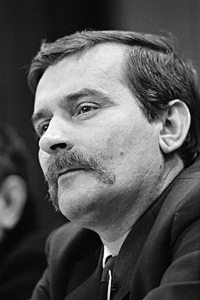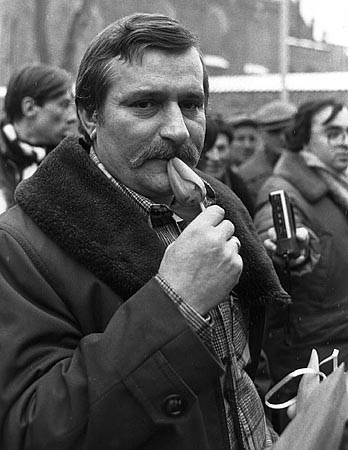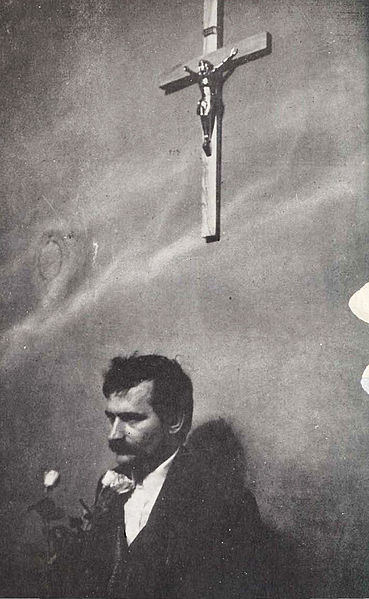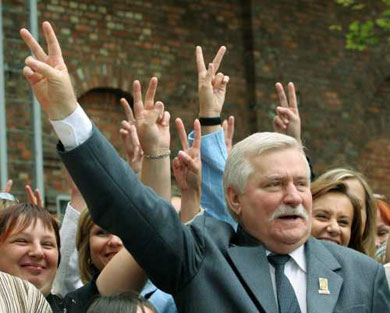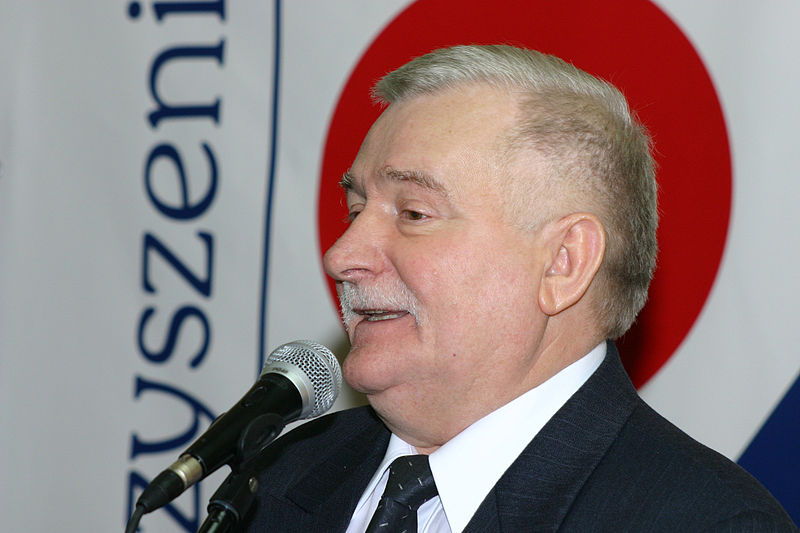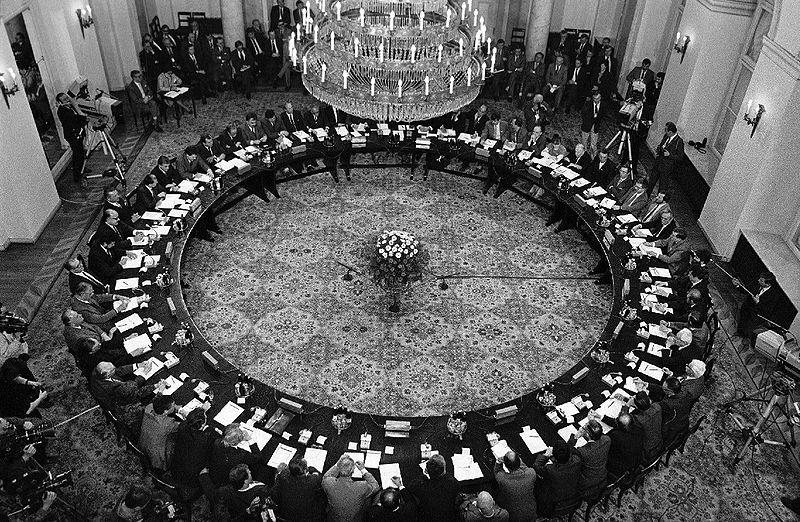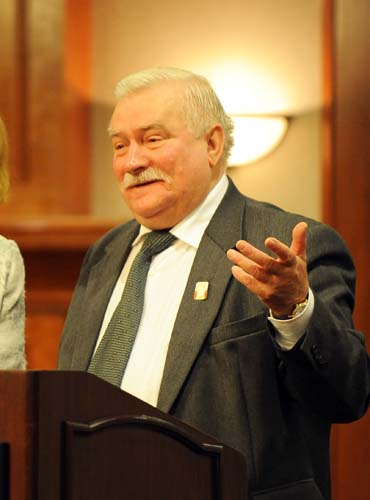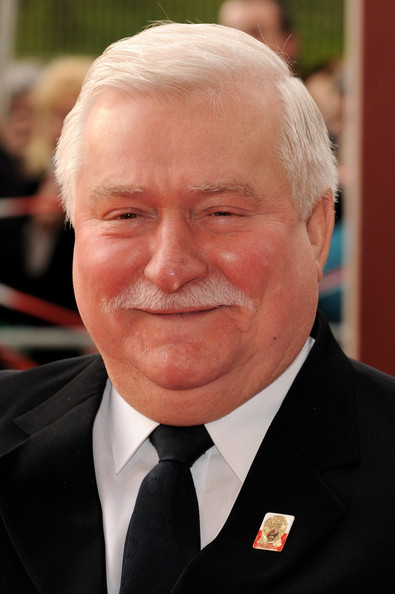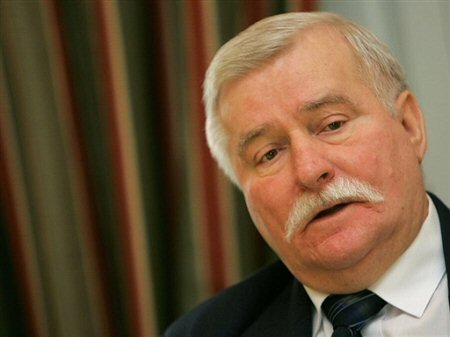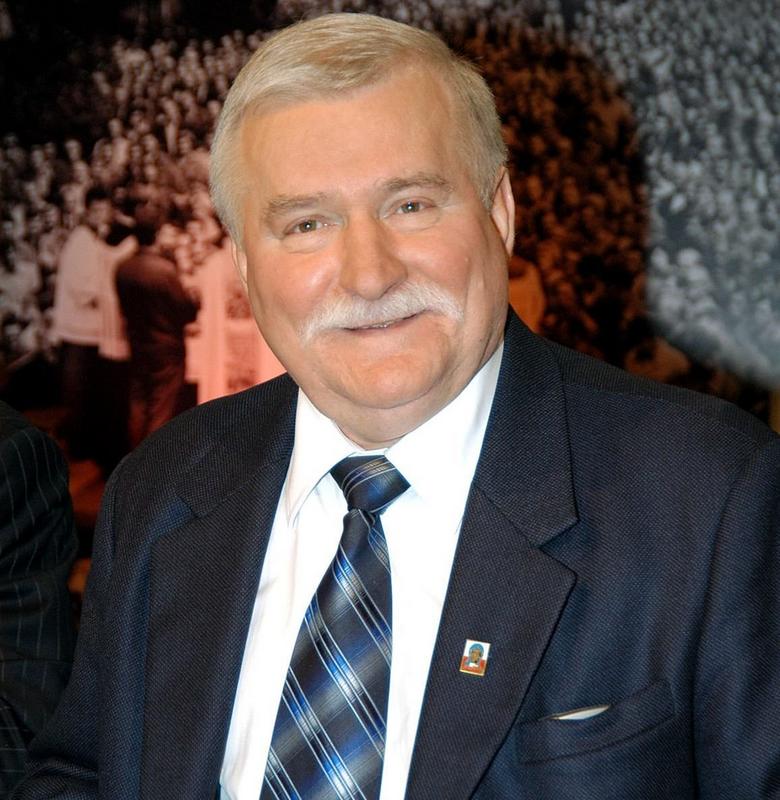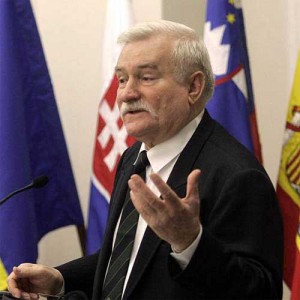<Back to Index>
- 1st President of Poland Lech Wałęsa, 1943
PAGE SPONSOR
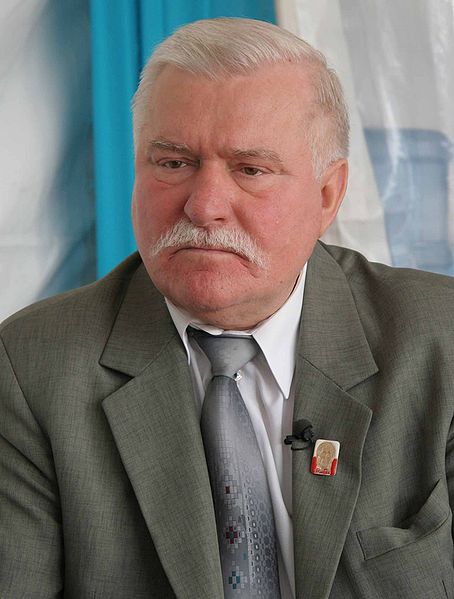
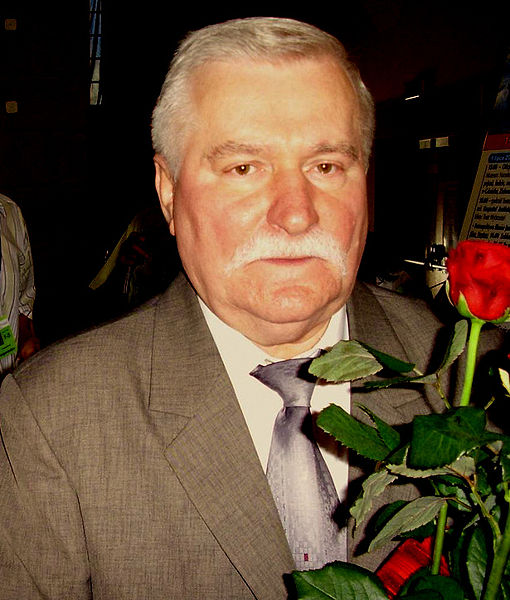
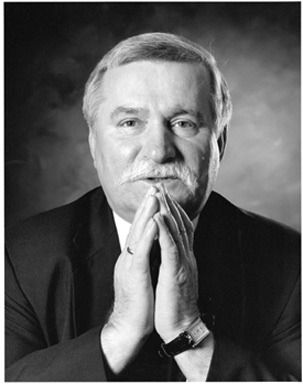
Lech Wałęsa (Polish: Lech Wałęsa) (born 29 September 1943) is a Polish politician, trade union organizer, and human rights activist. A charismatic leader, he co-founded Solidarity (Solidarność), the Soviet bloc's first independent trade union, won the Nobel Peace Prize in 1983, and served as President of Poland between 1990 and 95.
Wałęsa was an electrician by trade, with no higher education. Soon after beginning work at the Gdańsk (then, "Lenin") Shipyards, he became a trade union activist. For this he was persecuted by the Polish communist government, placed under surveillance, fired in 1976, and arrested several times. In August 1980 he was instrumental in negotiations that led to the ground breaking Gdańsk Agreement between striking workers and the government, and he became a co-founder of the Solidarity trade union movement. Arrested again after martial law was imposed and Solidarity was outlawed, upon release he continued his activism and was prominent in the establishment of the 1989 Round Table Agreement that led to semi free parliamentary elections in June 1989 and to a Solidarity led government.
In 1990 he successfully ran for the newly re-established office of President of Poland. He presided over Poland's transformation from a communist to a post - communist state, but his popularity waned. After he narrowly lost the 1995 presidential election, his role in Polish politics was
diminished. His international fame remains, however, and he speaks and
lectures in Poland and abroad on history and politics. Wałęsa was born in Popowo, Poland, on 29 September 1943. His
father Bolesław was a carpenter who was arrested by the Nazis before
Lech was born and thrown into the concentration camp at Mlyniec.
Boleslaw returned home after the war but lived only two months before
succumbing to exhaustion and illness - he was not yet 34 years old. In 1961 Lech graduated from primary and vocational school in nearby Chalin and Lipno as
a qualified electrician, worked from 1961 to 1965 as a car mechanic,
then embarked on his two year obligatory stint of military service,
attaining the rank of corporal, before beginning work at the Lenin Shipyard in Gdańsk (Stocznia Gdańska im. Lenina, now the Gdańsk Shipyard, Stocznia Gdańska) as an electrician on 12 July 1967. On 8 December 1969 he married Danuta Gołoś. The couple have eight children: Bogdan, Sławomir, Przemysław, Jarosław, Magdalena, Anna, Maria - Wiktoria, Brygida. From
early on, Wałęsa was interested in workers' concerns; in 1968 he
encouraged shipyard colleagues to boycott official rallies that
condemned recent student strikes. A charismatic leader, he was an organizer of the illegal 1970 strikes at the Gdańsk Shipyard (the Polish 1970 protests) when workers protested the government's decree raising food prices; he was considered for chairman of the strike committee. The strikes' outcome, involving over 30 worker deaths, galvanized his views on the need for change. In
June 1976, Wałęsa lost his job at the Gdańsk Shipyards for his
continued involvement in illegal unions, strikes and a campaign to
commemorate the victims of the 1970 protests. Afterwards,
he worked as an electrician for several other companies, but was
continually laid off for his activism and was jobless for long periods. He and his family were under constant surveillance by the Polish secret police; his home and workplace were always bugged. Over the next few years, he was arrested several times for participating in dissident activities. Wałęsa worked closely with the Workers' Defence Committee (KOR), a group that emerged to lend aid to individuals arrested after 1976 labor strikes and to their families. In June 1978 he became an activist of the underground Free Trade Unions of the Coast (Wolne Związki Zawodowe Wybrzeża). On 14 August 1980, after another food price hike led to a strike at the
Lenin Shipyard in Gdańsk — a strike of which he was one of the
instigators — Wałęsa scaled the shipyard fence and, once inside, quickly
became one of the strike leaders. The strike inspired similar strikes, first at Gdańsk, then across Poland. Wałęsa headed the Inter - Plant Strike Committee, coordinating the workers at Gdańsk and at 20 other plants in the region. On 31 August, the communist government, represented by Mieczysław Jagielski, signed an accord (the Gdańsk Agreement) with the Strike Coordinating Committee. The
agreement, besides granting the Lenin Shipyard workers the right to
strike, permitted them to form their own independent trade union. The Strike Coordinating Committee legalized itself as the National Coordinating Committee of the Solidarność (Solidarity) Free Trade Union, and Wałęsa was chosen chairman of the Committee. The
Solidarity trade union quickly grew, ultimately claiming over 10
million members — more than a quarter of Poland's population. Wałęsa's
role in the strike, in the negotiations, and in the newly formed
independent trade union gained him fame on the international stage. Wałęsa held his position until 13 December 1981, when General Wojciech Jaruzelski declared martial law. Wałęsa, like many other Solidarity leaders and activists, was arrested; he would be incarcerated for 11 months at several eastern towns (Chylice, Otwock, and Arłamów, near the Soviet border) until 14 November 1982. On 8 October 1982, Solidarity was outlawed. In 1983 Wałęsa applied to return to the Gdańsk Shipyard as a simple electrician. That same year, he was awarded the Nobel Peace Prize. He was unable to accept it himself, fearing that Poland's government would not let him back into the country. His wife Danuta accepted the prize on his behalf. Through the mid 1980s, Wałęsa continued underground Solidarity related activities. Every issue of the leading underground weekly, Tygodnik Mazowsze, bore his motto, "Solidarity will not be divided or destroyed." Following a 1986 amnesty for Solidarity activists, Wałęsa co-founded the first overt legal Solidarity entity since the declaration of martial law — the Provisional Council of NSZZ Solidarity (Tymczasowa Rada NSZZ Solidarność). From
1987 to 1990, he organized and led the "semi - illegal" Provisional
Executive Committee of the Solidarity Trade Union. In late summer 1988,
he instigated work stoppage strikes at the Gdańsk Shipyard. After months of strikes and political deliberations, at the conclusion of the 10th plenary session of the Polish United Workers Party, or PZPR (the Polish communist party), the government agreed to enter into Round Table Negotiations that lasted from February to April 1989. Wałęsa was an informal leader of the "non - governmental" side in the negotiations. During the talks, he traveled the length and breadth of Poland, giving speeches in support of the negotiations. At
the end of the talks, the government signed an agreement to
re-establish the Solidarity Trade Union and to organize "semi - free"
elections to the Polish parliament (semi - free since, in accordance with
the Round Table Agreement, only members of the Communist Party and its
allies could stand for 65% of the seats in the Sejm). In December 1988, Wałęsa co-founded the Solidarity Citizens' Committee. Theoretically it was merely an advisory body, but in practice it was a kind of political party and won the parliamentary elections in June 1989 (Solidarity took all the seats in the Sejm that were subject to free elections, and all but one seat in the newly re-established Senate). Wałęsa
was one of Solidarity's most public figures; though he did not run for
parliament himself, he was an active campaigner, appearing on many
campaign posters. In
fact, Solidarity winners in the Sejm elections were referred to as
"Wałęsa's team" or "Lech's team," as all those who won had appeared on
their election posters together with him. While
ostensibly only chairman of Solidarity, Wałęsa played a key role in
practical politics. At the end of 1989 he persuaded leaders of former
communist allied parties to form a non - communist coalition government –
the first non - Communist government in the Soviet Bloc. The parliament elected Tadeusz Mazowiecki as prime minister – the first non - communist Polish prime minister in over four decades. Following
the June 1989 parliamentary elections, Wałęsa was disappointed that
some of his former comrades - in - arms were satisfied to govern alongside former communists. He decided to run for the newly re-established office of president, using the slogan, "I don't want to, but I've got no choice" ("Nie chcem, ale muszem."). On 9 December 1990, Wałęsa won the presidential election, defeating Prime Minister Mazowiecki and other candidates to become the first democratically elected president of Poland. In 1993 he founded his own political party, the Nonpartisan Bloc for Support of Reforms (BBWR – the initials echoed those of Józef Piłsudski's "Nonpartisan Bloc for Cooperation with the Government," of 1928 – 35, likewise an ostensibly non - political organization). During his presidency, Wałęsa saw Poland through privatization and transition to a free market economy (the Balcerowicz Plan), Poland's 1991 first completely free parliamentary elections, and a period of redefinition of Poland's foreign relations. He successfully negotiated the withdrawal of Soviet troops from Polish soil and won a substantial reduction in Poland's foreign debts. Wałęsa supported Poland's entry into NATO and into the European Union (both these goals would be realized after his presidency, in 1999 and 2004, respectively). In the early 1990s, Wałęsa proposed the creation of a "NATO bis" as a sub - regional security system. The concept, while supported by right wing and populist movements in Poland, garnered little support abroad; Poland's neighbors, some of whom (e.g., Lithuania) had only recently regained independence, tended to see the proposal as Polish "neo - imperialism." Wałęsa
has been criticized for a confrontational style and for instigating
"war at the top," whereby former Solidarity allies clashed with one
another, causing annual changes of government. This increasingly isolated Wałęsa on the political scene. As
he lost more and more political allies, he came to be surrounded by
people who were viewed by the public as incompetent and disreputable. Mudslinging during election campaigns tarnished his reputation. The
ex-electrician with no higher education was thought by some to be too
plain spoken and too undignified for the post of president. Others thought him too erratic in his views or complained that he was too authoritarian – that he sought to strengthen his own power at the expense of the Sejm. Finally,
Wałęsa's problems were compounded by the difficult transition to a
market economy; while in the long run it was seen as highly successful,
it lost Wałęsa's government much popular support. Wałęsa's BBWR performed poorly in the 1993 parliamentary elections; at times his popular support dwindled to some 10%, and he narrowly lost the 1995 presidential election, gathering 48.72% of the vote in the run - off against Aleksander Kwaśniewski, who represented the resurgent Polish post - communists (the Democratic Left Alliance, SLD). Wałęsa's
fate was sealed by his poor handling of the media; in the televised
debates, he came off as incoherent and rude; at the end of the first of
the two debates, in response to Kwaśniewski's extended hand, he replied
that the post - communist leader could "shake his leg." After
the election, Wałęsa said he was going to go into "political
retirement," and his role in politics became increasingly marginal. Since
the end of his presidency, Wałęsa has lectured on Central European
history and politics at various universities and organizations. In 1996 he founded the Lech Wałęsa Institute, a think tank whose mission is to support democracy and local governments in Poland and throughout the world. In 1997 he helped organize a new party, Christian Democracy of the 3rd Polish Republic; he also supported the coalition Solidarity Electoral Action (Akcja Wyborcza Solidarność), which won the 1997 parliamentary elections. However, the party's real leader and main organizer was a new Solidarity Trade Union leader, Marian Krzaklewski. Wałęsa ran again in the 2000 presidential election, but received only 1% of the vote. During Poland's 2005 presidential elections, Wałęsa supported Donald Tusk, saying that he was the best candidate. In 2006 Wałęsa quit Solidarity, citing differences over the union's support of the Law and Justice party, and the rise to power of Lech and Jarosław Kaczyński. On 27 February 2008, at Methodist DeBakey Heart and Vascular Center, in Houston, Texas, in the United States, Wałęsa underwent a coronary artery stent placement and the implantation of a cardiac pacemaker. In the run up to the 2009 European Parliament elections, he appeared at a rally in Rome to endorse the pan - European Eurosceptic party Libertas, describing it and its founder Declan Ganley as "a force for good in the world." Wałęsa admitted that he had been paid to give the speech but claimed to support Civic Platform, while expressing the hope that Libertas candidates would be elected to the European Parliament. He is member of the international advisory council of the Victims of Communism Memorial Foundation. Over the years, Wałesa has been accused of having been an informer for the Polish secret police Służba Bezpieczeństwa (SB) in the early 1970s, codenamed "Bolek". Although this was long before Wałęsa emerged as a hero of the Solidarity, questions remain whether it had an effect on his later decisions; for example, making him a probable target of blackmail. On 11 August 2000, the Warsaw Appellate Court, V Wydział Lustracyjny, declared that Wałęsa's lustration statement was true – that he had not collaborated with the communist regime. Nonetheless, periodically the question resurfaces. A 2008 book by historians from the Institute of National Remembrance (IPN), Sławomir Cenckiewicz and Piotr Gontarczyk,
presenting new evidence, received substantial coverage in the media,
provoked a hot nation - wide debate, and was noted by the international
press. The
book is seen by some as very controversial; however, it contains over
130 pages of documents from archives of the secret police (which were
inherited by the IPN) to support its claims, and Cenckiewicz defended his discoveries on a factual basis. Janusz Kurtyka, president of the Institute of National Remembrance at
the time, staunchly affirmed the thesis of the book while admitting
that it does not contain a "hundred - percent" proof that Wałęsa was the
agent Bolek, as
some of the documents went missing during Wałęsa's presidency of Poland
(1990 – 1995). He expressed hope the book would be subject to a wider
debate. Wałęsa
himself denies having collaborated with the secret police, and others
have noted that the Polish secret police commonly falsified documents. In November 2009 Wałęsa sued the then president of Poland, Lech Kaczyński, over his having repeated the collaboration allegations. On 15 April 2010, during a civil trial brought by Wałęsa against former fellow activist Krzysztof Wyszkowski over the collaboration allegations, a retired MO and Służba Bezpieczeństwa officer appeared in court and confirmed the fact of Wałęsa's collaboration in a sworn testimony. The
officer, Janusz Stachowiak, was in charge of keeping documentation on
Wałęsa from December 1970 to 1974 (which shows these documents were not
fabricated later), although never met him in person. He stated that
Wałęsa was convinced to cooperate by SB Capt. Henryk Rapczyński and SB
Capt. Edward Graczyk, after a two hour interrogation, albeit without the
use of threats, and signed an agreement to keep his cooperation with SB in secret. The officers asked him to "calm down" the atmosphere in the shipyard after protests were bloodily suppressed. Wałęsa kept meeting regularly with the secret police, reportedly receiving substantial sums of money, but
after about 4 months he started to "withdraw" (although it was not
until June 1976 when he was unregistered, because of his "reluctance to
cooperate"). Previously,
in 2008, Capt. Edward Graczyk (long thought to be deceased and as such
not summoned to testify in the 2000 trial) was interrogated by the IPN about his contacts with Wałęsa and subsequently interviewed by Gazeta Wyborcza. In
the interview, which somewhat contradicts his earlier testimony,
Graczyk recounted Wałęsa's cooperation, but denied his own actions had
been "recruitment" of an agent. He also denied giving money to Wałęsa.
The other of the two officers, Capt. Henryk Rapczyński, was never
interrogated. In February 2011, in an interview with Monika Olejnik about the Smolensk disaster, Wałęsa finally admitted that he had signed a "commitment to cooperation" with the secret police Służba Bezpieczeństwa in 1970, simultaneously
downplaying the importance of the fact. Although marking a significant
change of tone compared to Wałęsa's previous statements, the
declaration went relatively unnoticed, and did not receive
international media coverage. Wałęsa is a devout Roman Catholic and
a staunch opponent of abortion, and has said that he would rather have
resigned the presidency twenty times than sign into law a bill
permitting abortion in Poland. He
has also said that he is interested in information technology and likes
to use new developments in that field. He has claimed to have
personally assembled several computers to find out how they work, and
has said that he takes a smartphone, a palmtop, and a laptop with him when traveling. Early in 2006 he revealed that he is a registered user of the Polish instant messaging service Gadu - Gadu, and was granted a new special user number – 1980. Later that year, he also said that he used Skype, his "handle" being lwprezydent2006. It is rumored that around 1980 Gillette offered him $1,000,000 to shave off his trademark moustache in a commercial, but that he refused. A couple of years later, though, he surprised the public by shaving off the mustache for personal reasons. Apart from his 1983 Nobel Peace Prize, Wałęsa has received many other international distinctions and awards. He has been named "Man of the Year" by Time Magazine (1981), The Financial Times (1980) and The Observer (1980). He was the first recipient of the Liberty Medal, on 4 July 1989 in Philadelphia, Pennsylvania, and that same year received the Presidential Medal of Freedom. He is the only Pole to have addressed a joint meeting of the United States Congress (15 November 1989). On 8 February 2002, Wałęsa represented Europe, carrying the Olympic flag at the opening ceremonies of the XIX Olympic Winter Games in Salt Lake City, in company with Archbishop Desmond Tutu (Africa), John Glenn (the Americas), Kazuyoshi Funaki (Asia), Cathy Freeman (Oceania), Jean - Michel Cousteau (Environment), Jean - Claude Killy (Sport), and Steven Spielberg (Culture). Two years later, on 10 May 2004, Gdańsk International Airport was officially renamed Gdańsk Lech Wałęsa Airport to commemorate a famous Gdańsk citizen, and his signature was incorporated into the airport's logo. A month later, in June 2004, Wałęsa represented Poland at the state funeral of Ronald Reagan. On 11 October 2006, Wałęsa was keynote speaker at the launch of "International Human Solidarity Day," proclaimed in 2005 by the United Nations General Assembly. In January 2007 Wałęsa spoke at a Taiwan event,
"Towards a Global Forum on New Democracies," in support of peace and
democracy, along with other prominent world leaders and Taiwan's
President Chen Shui-bian. On 25 April 2007, Wałęsa represented the Polish government at the funeral of Boris Yeltsin, former President of the Russian Federation. On
23 October 2009, he spoke at a conference in Gdańsk of presidents of
all European senates, commemorating the 20th anniversary of the first
free parliamentary elections in a former communist country – the 1989
elections to the Polish Senate. On 6 September 2011, Wałęsa rejected Lithuania's Order of Vytautas the Great as a result of constant discrimination on the part of the Lithuanian government towards its Polish minority. Wałęsa has been portrayed in numerous works of popular culture. In Volker Schlöndorff's film Strike, a character based on Wałęsa was played by Polish actor Andrzej Chyra. Wałęsa played himself in Andrzej Wajda's 1981 Golden Palm winning film about Solidarity, Man of Iron. While this was perhaps his best known movie appearance, he has played himself in some 20 other productions. In the 1990s two satirical Polish songs, "Nie wierzcie elektrykom" ("Don't Trust Electricians") by Big Cyc, and "Wałęsa, gdzie moje 100 000 000" ("Wałęsa, Where's My 100,000,000 [złotych]?") by Kazik Staszewski, were major hits in Poland, and another song about Wałęsa was composed in 2009 by Holy Smoke. He also inspired U2's song "New Year's Day" on their War album. Coincidentally the Polish authorities lifted martial law on 1 January 1983, the very day that this single came out. Patrick Dailly's Solidarity, starring Kristen Brown as Wałęsa, was premiered by the San Francisco Cabaret Opera in Berkeley and Oakland, California, in September and October 2009. Wałęsa has been the subject of dozens of books and articles. He himself has authored three books: Droga nadziei (The Road of Hope, 1987), Droga do wolności (The Road to Freedom, 1991), and Wszystko, co robię, robię dla Polski (All That I Do, I Do for Poland, 1995).
